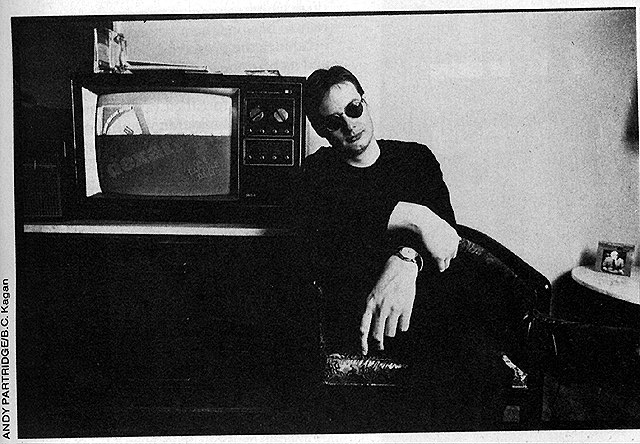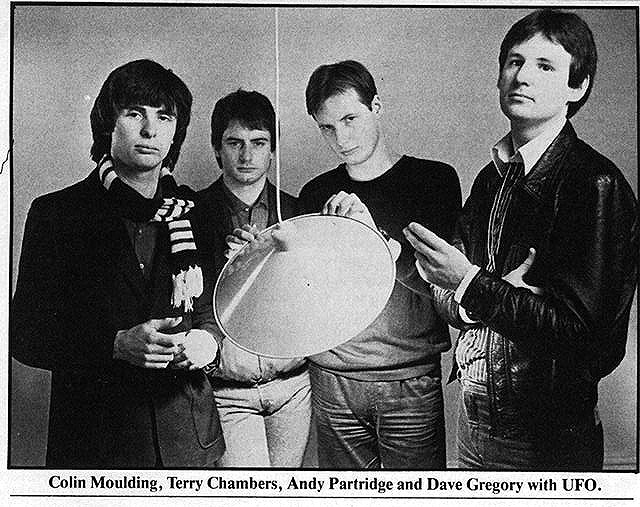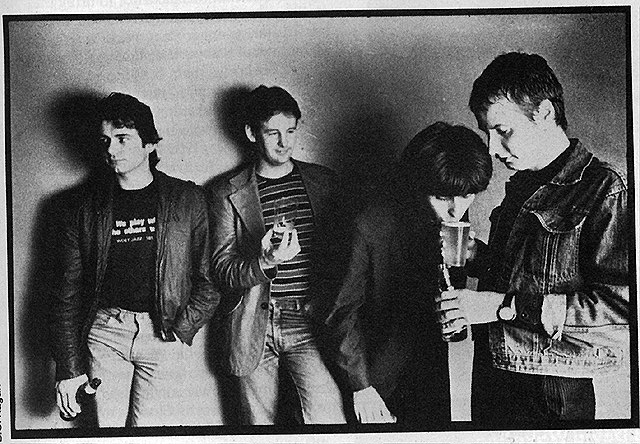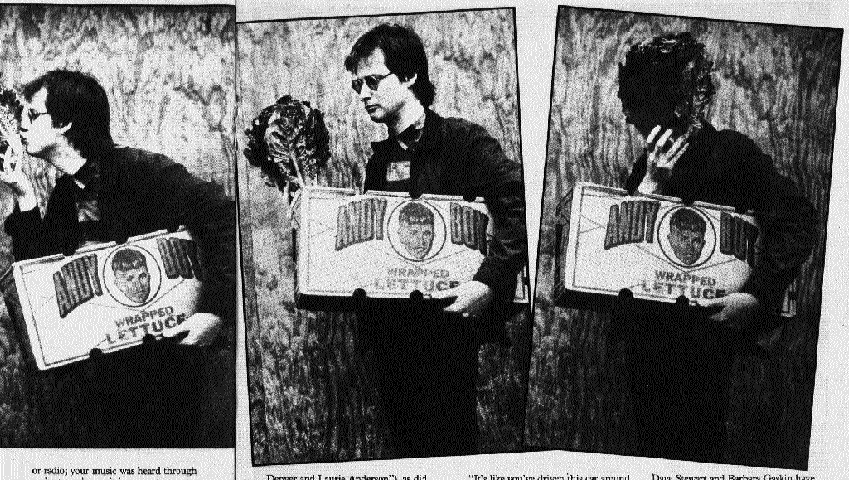The Case of the Missing Andy Boy
Trouser Press
October 1983
by Harry George
pp. 26-29
Stalking the rare Partridge; or where's XTC?
Nineteen eighty-two was a watershed year for XTC. Their fifth album, English Settlement, showed expanded studio range, featuring alto sax, fretless bass, and l2-string guitar, but sacrificed a lot of attack in the process. The band's decision to abandon live performance (after a US tour was cancelled due to singer/guitarist Andy Partridge's collapse at the first gig) thus seemed doubly ominous. Bassist Colin Moulding's slow-talking fatalism in an interview last fall hardened the conviction that an artistic cul-de-sac lay ahead.
Far from it. A cassette of XTC's projected next album, Mummer, was a firm favorite of mine for weeks before my meeting with Partridge in his native Swindon. The zest and invention of English pastoral classics like the Small Faces' Ogden's Nut Gone Flake and the Kinks' Village Green Preservation Society typifies the 10 songs: Partridge has finally equalled his heroes on their own ground. Yet he seems doubtful the public will hear the LP in its original form.

"There's so many things against it even being released," Partridge says. Sitting at home, the relaxed, friendly musician seems poles apart from the exhausted figure who found touring incompatible with his health. The only thing now clouding his countenance is the hint of a goatee.
"We didn't get on well with the producer [Steve Nye] and went on to another [Bob Sargeant]. Virgin [XTC's British label] said, 'There's no singles on it, go away and write some more,' so I came up with 'Great Fire.' They put it out and the BBC ignored it; consequently it never sold a light and Virgin got very pessimistic about the chances of the whole album."
This despite English Settlement being the most successful (in the UK) XTC album to date, while continuing the group's in-and-out singles chart career.
"Things that we think will sell are totally ignored. Yet 'Senses Working Overtime,' which is like a piece of Russian film music in the verses with a Flamin' Groovies chorus, became a hit. I suppose it's a lesson to Virgin to take chances: The safe ones they put out never sell. 'Ball and Chain' did nothing."
Partridge is far from offended at hearing his new album described as "pastoral."
"I take that as a compliment," he insists. "When you live in this area the real world happens to be 60 or 70 percent pastoral; you can't go anywhere two miles in Swindon without hitting downs or sheep. 'Pastoral' to me means being more in touch with the country than the city, which I think we are. London gives me the willies.
"The only criticism I can see looming is from all those people who liked our quasi-political songs [on English Settlement]. This album is a lot more unprincipled."
Certainly, Mummer could not be accused of willful escapism -- even if "Love on a Farm Boy's Wages" and "In Loving Memory of a Name" evoke a tranquility and stability familiar to few of us. "Ladybird" is as dreamy as Pink Floyd's More or "Grantchester Meadows," but XTC's sound is tough enough elsewhere. "Beating of Hearts" opens the album with an insistent drum riff; "Human Alchemy" is ominous and brooding; "Funk Pop a Roll" ("eats up my soul") is Partridge's blast at the hollow music pouring from his radio.
XTC's problems are compounded by Virgin's dislike of the proposed Mummer sleeve. Mummers represent an old English tradition of dumb show, performed in disguise and usually at Christmastime. In approximation of this the nixed cover photo shows Partridge, Moulding and guitarist Dave Gregory clad in shredded newspaper.
"A lot of mummers wear suits of newspaper and have done so since early Victorian times. I thought it would be really interesting to be disguised in an information process for a once-yearly ceremony -- which making an LP usually is. But Virgin said, 'People won't understand what mummers are, they won't know why you're dressed in newspapers.' I'm thinking of changing it to three newspaper men, like the ones children make by tearing paper. That's an image a lot of people know immediately as a childish/primitive device."

Virgin's attitude has come a long way from the days of Go 2, XTC's second album, with a conceptual all-type cover.
"The general feeling at that time was one of experimentation -- anything new was worth trying. But since we haven't risen to Culture Club heights. . . I'm told they really like us but don't know how to sell us. We're not the archetypal group; I was in that mold at one time but quickly fell out of it."
Indeed, XTC is less salable than ever, now that the band has given up touring. Did Partridge have any warning of what seems to have been a nervous illness? "A phobia about being in front of people," he laughs. "Yeah, it was building for years -- being locked away in hotel rooms seeing nobody, then all of a sudden seeing five or ten thousand people. I wasn't eating very well, eating the wrong things and so I associated being on the road with being ill."
Dietary problems played their part in his first collapse, in Paris. "I hadn't eaten for three days, and my not wanting to go in front of the public was getting worse and worse. I ran out on stage and after the first few chords of the first song I just collapsed. We cancelled the English tour. I went to see psychiatrists, doctors -- a hypnotist, even -- and went to America thinking I might be cured.
"The first gig was as if I'd never played the guitar before. The next night I said, 'Look, I think I'm going crazy, let's call a halt.' I considered myself to have had a nervous breakdown, the second one I'd had through touring. I had a really bad experience in 1979 in which I just forgot who I was, what I was doing and started wandering off aimlessly."
Partridge's bandmates were supportive of the frazzled frontman -- with the exception of drummer Terry Chambers.
"Terry had no time for anyone, whether it was somebody who'd cut their thumb or somebody who'd had their leg wrenched off in an industrial accident. He would just say, 'Don't be a baby.' After the cancelled show in Los Angeles he flew straight to Australia to be with his girlfriend, who had become pregnant. It's like Dallas, really!
"We came back to England. I went for more treatments and realized I really enjoyed being at home, writing at home and working in the studio. During my convalescence I wrote lots of songs. We phoned Terry or wrote him letters continuously, saying, 'Are you coming back?' He said, 'Sure, sure' and delayed it for months and months.

"He came back eventually and just seemed to have lost heart in his drumming. We rehearsed for four or five weeks. Two weeks before making this album he just put his drumsticks down and said, 'Look, I'm not really a very good drummer, I'm just faking this. I should be taking my wife back to Australia and I'm sick of struggling. We're never gonna make it, your writing's got weirder and weirder.'
"He had this huge explosion of downism, said bye-bye and walked out. We tried to talk him out of it, but he'd made up his mind months before and only came back to appease us."
At least Chambers's two appearances on Mummer ("Beating of Hearts" and "Wonderland") show no fall-off in his playing. Pete Phipps, once of the Glitter Band, does an admirable job on the rest. Partridge, though, says Phipps is not to be considered XTC's newest member.
"We were rather confused about whether we should accept him into the band. We didn't, purely because since we've decided not to tour there'd be a lot for him not to do. Also, he's not a local lad. There's lots of local, interpersonal language that means nothing to anybody outside the band and is very difficult to bring people into."
Personnel turnover wasn't XTC's only problem in recording Mummer. The band found producer Steve Nye excessively thorough.
"He was extremely slow and painstaking," Partridge says, "and it tended to kill the spontaneity. We might get to the studio and say, 'Hey, let's use some platypus ducks on this.' Steve would go, 'Now hold on, where are we gonna get them from and what size are they gonna be?' Silly example, but you know what I mean."
Moulding, however, had said that he and Partridge (XTC's two songwriters) make demos of their songs, which the group follows pretty closely.
"Not totally true," Partridge states. "We give a general atmospheric description and ask if the others can contribute something -- even changing the chord structure or suggesting word changes. We don't pander to each others egos, we pander to the good of the song. We're not technically outstanding musicians so we try to find the magic in a song and play that."
Fortunately for Partridge, Moulding shares his views about touring. But what about guitarist Gregory?
"I think Dave misses it for two reasons. He's an absolute tourist at heart, always has his cameras and notebook handy. Also, he's in the R&B guitarist tradition: get up, plug in your guitar, stamp your foot and go."
XTC isn't the sort of band to get up and play in local pubs. Partridge says what killed that spirit was the experience of playing "huge ice hockey stadiums":
"Once you've done that, it's very difficult to go backwards. You have lots of stupid things nagging at you, like wondering whether your equipment might break down and where would you get spares, or possibly getting frustrated because the people around you are having a good time more than they are playing the songs."
His objections to arena-rock reveal the aversions that contributed to his breakdown.
"You do a little improvisation which is subconscious at one gig, then you catch yourself doing it again and again. You get to the point when you think to yourself, 'When I hit this chord I'm gonna leap on one foot, go to one side and look over to the left. Here I am, yes, I'm doing the action, I knew I would.' You become detached from yourself."
Is there any way of making touring more civilized?
A great carrot to carry the touring cart would be the reward of huge commercial success. Seeing as we've had no financial reward from it and our success is very 'underground' (an old-fashioned word that works very well), it was difficult to keep the momentum of this donkey cart going.
"Discerning buyers all around the globe write us incredible letters. They say we're the first band they've liked since the Beatles split up. It's quite alarming. We get most of our mail from the States -- about 95 percent."
Perhaps it's XTC's flair for colorful in instrumentation that encourages comparison to Partridge's '60s idols. "Great Fire" includes cellos and violas, "Gold" has trombones. He holds out for the real thing over synthesized sounds. "It doesn't sound warm enough if you simulate them."
Even more fab is a new song, "Seagulls Screaming (Kiss Her Kiss Her)," recorded solo at home using Mellotron and drum machine: the result is a magical mystery tour down Blue Jay Way, right down to the disembodied vocal.
Partridge is beginning to sympathize with Van Morrison's preference for a small, faithful cult over a fickle mass following.
"That's where our arrows are falling. But there aren't many bands who've decided not to tour, to do this cottage industry thing, and have a history to learn from. Most bands who gave up touring when it was fashionable in the '60s self-destructed, but the climate is different now. So is the technology: You can do so much more in the studio. That inventiveness lies in imposing a primitivism on yourself."
Despite the punk notion that gigs are what it's all about, pop music has an equally valid tradition of great records which are explicitly impossible to reproduce live. Partridge clearly relates to the Phil Spector aesthetic of studio perfection rather than the hurlyburly world of music promotion.
photo by Lisa Haun"I think I see XTC now as the kind of people who would have written music in the 18th century. You weren't under the magnifying glass; you never went on TV or radio; your music was heard through orchestras playing it in concert, or through people buying sheet music. I'd love not to have to make videos, but to follow the pure way of putting our music down -- that is, making records rather than writing out scores for an orchestra."
He quite enjoys gigs, as long as they're not his, but has no illusions about the level at which they communicate.
"A gig is mostly a social thing. The best gigs have a communal feeling, like a football crowd, everyone locked into this big vibe. Probably the best gigs around are Rod Stewart's, where all the moms are locked into this sex groove, or the Grateful Dead's, where everyone lives out a fantasy of being a down-home, shit-kicking Dead roadie. Whenever we played, I always wanted to be in the audience."
Far from the world's hockey stadiums, Andy Partridge has not been idle. He's produced Peter Blegvad, of Slapp Happy fame, for Virgin. Partridge also played with Blegvad ("a cross between John Denver and Laurie Anderson"), as did Moulding and ex-Feelies drummer Anton Fier. He's further keeping a producer's eye on the Cocteau Twins.
Then there's his soundtrack music for the film Liquidream by Mike Portelly, still unfinished. "He's an excellent underwater photographer and has done several fashion spreads where the models stand on the sea bed and hold their breath. It's a modern-day mermaid story; the music probably sounds like some XTC B-sides in the 'Homo Safari' series. Somebody told me the other day that we skipped number four in the series; it wasn't intentional."
The "Homo Safari" series of mock-ethnic recordings is one example of the artistic freedom XTC apparently enjoys at Virgin. Partridge has also dabbled in dub remixes, among them a solo album, Take Away / The Lure of Salvage.
"We got the leeway only because we paid for it. Take Away was great fun; I've gone on to use those lessons in our music."
Unlike most dub reggae, Partridge's remixes leave the original tunes virtually unidentifiable.
"It's like you've driven this car around and you're fed up with its shape. You say OK, I'm gonna get a welding torch, hammer and saw, chop the car up and make something else out of it. I did Take Away totally royalty-free at a cost of £ 2,000 [pounds Sterling], which is nothing, and said, 'Don't charge a lot of money for it, 'cause I don't like expensive music.' In Japan it was hailed as a work of electronic genius and outsold all the XTC albums. They had to press it up again with liner notes in Japanese.
"Someone did a ballet to Go Plus [a 1978 dub EP included with some pressings of Go 2] in New York when it came out, I discovered a year later."
Although convinced XTC is omitted from every rock reference book -- "They go 'X, X-Ray Spex, Yes, Neil Young!"' -- Partridge takes consolation in a select crop of cover versions.
"An all-girl South African group did 'Complicated Game.' A Bavarian oompah band did 'Making Plans for Nigel' as 'Making Plans for Otto' (in German). Dave Stewart and Barbara Gaskin have done 'Roads Girdle the Globe'; it's slick, with a terrific Todd Rundgren board solo."
XTC's sophisticated, ironic music doesn't exactly lend itself to the Hit Parade. David Bowie may be able to resort to the contrived moon-Junery on "Let's Dance," but one can't imagine Partridge writing a modern equivalent of "Twisting the Night Away."
"We'd feel bad about being that obvious. It would be acting as if I had less intelligence than I really have."
XTC's refusal to take the calculated path puts the future of Mummer in doubt. If "Wonderland," the next single, isn't a hit, Partridge doubts the album will come out. One hopes the band's modus operandi finds favor with record company and fans sooner than later.
For the moment, cups of tea, model airplanes and a dog named Charlie Parker are having the best effect on Partridge's work. May he never become Swindon's answer to Brian Wilson, Phil Spector and John Fogerty, an isolated talent eroded by self-doubt.
Go back to Chalkhills Articles.
